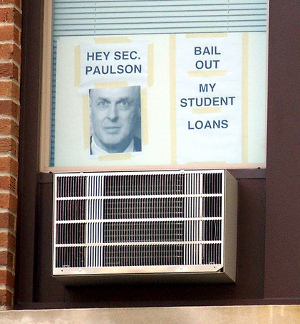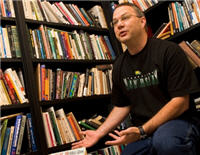Earlier this month, Tom ordered a microbiology textbook from the Amazon Marketplace. It arrived in the mail later that week, and everything was fine. Then he received another copy of the book the next day. Then a third, and a fourth. All of the books were identical, and his credit card was only charged for the first one. What was going on here? More importantly, what was he supposed to do with the extra textbooks? [More]
college is expensive

Kaplan University Demands $3,310.56 After Graduation, Can't Explain What For
Melinda has an MBA from Kaplan University, and has enough business sense to know that she shouldn’t have to pay debts that aren’t hers in the first place. The for-profit college, part of the Washington Post Company, has decided that she owes them more than $3,000 even though her tuition was long ago paid with federal financial aid. No one can show her a detailed breakdown of the bill, or explain why no one noticed that she owed the money until months after graduation. Update: Kaplan has since resolved Melinda’s problem. [More]

Did eCampus Ever Send Customer Her Textbook Or Her Refund?
What’s worse than paying ridiculous prices for textbooks? Paying a slightly less ridiculous price for a textbook, then never receiving the book or the refund the company promises. In October, more than halfway through the semester, Emily was forced to request a chargeback for a book that she never received. She suspects that the company never mailed it at all, and they also never issued her a promised refund. [More]

Sallie Mae Sends Student Loan Bills Into Abyss, Still Expects Me To Pay Them
Unless you’re the U.S. Postal Service, paperless billing can be a real blessing. It saves trees and clutter, saves companies money, and is generally quite useful. James tells Consumerist that he discovered a case where paperless billing is not so great: when a company enrolls you in it without telling you, doesn’t verify that they have your e-mail address from the present decade, and sends collections after you. [More]

U.S. Department Of Education Cracking Down On For-Profit Colleges
The combination of record unemployment and federal stimulus money destined for education has led to an education boom of sorts. Especially for for-profit colleges. Now the U.S. Education department is taking another look at for-profit schools…particularly the tactics used by their admissions staff, and the compensation structures for employees. [More]

What Are The Most Expensive Colleges In America?
College is expensive, but the some colleges are more expensive than others. Collegegrotto.com rounded up the top 100 most expensive colleges in the United States, based on just tuition and room and board. The winner? Sarah Lawrence College, north of New York City.

College Textbooks: Shop Around, Ask Your Professors, And Save
It’s that magical time of year, when the bright, shining faces of college freshmen fall as they take their first look at modern textbook prices. Reader S., a manager at a college bookstore, read our post yesterday about custom college bookstore “packets” used to prevent students from purchasing their textbooks used. He sent us some tips about how to spot and avoid special profit-seeking textbook bundles, and how to actually save some money by…purchasing from the college bookstore?
../..//2009/07/03/robert-bowman-graduated-from-college/
Robert Bowman graduated from college and law school despite great adversity, and passed the New York bar exam on his fourth try. Now, the state bar association refuses to admit him because of his substantial student loan debt. You know, instead of letting him practice law so he can pay it off. Disturbing, and a cautionary tale: just because your student loan company isn’t sending you letters, that doesn’t mean they aren’t charging you fees. [New York Times]

Are "Customized" Textbooks A Scam?
NPR takes a look at the growing popularity of “customized” college textbooks—textbooks that have pieces from different books sewn together, usually with a chapter or two by the professor teaching the class.

Professor Says Textbooks Are Too Expensive, Quits Using Them
Ron Hammond, Phd, professor at Utah Valley State College, has quit using textbooks in his classes. Why? They’re too expensive.


